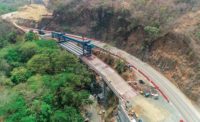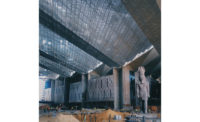Despite concerns over Europe's sluggish market, Turkey's Renaissance Construction is making a major push into western Europe. In addition to acquiring Alpine Bau's operations in Switzerland, it acquired a 75% stake in Germany's Heitkamp Ingenieur und Kraftwerksbau. "The target is to become more competitive, particularly on infrastructure projects," says Ugur Koyunoglu, chairman of Renaissance. He says Renaissance's acquisitions allow it to combine traditional European know-how with the flexibility of a contractor used to working in emerging markets.
In Eastern Europe, VINCI subsidiaries in Poland, the Czech Republic and Slovakia face a "sharp downturn in their construction markets," says Stubler. But they "maintain their overall operating margins" by diversifying into "more buoyant" sectors, he observes.
However, Karlström speaks positively about Poland, which is attracting increasing international investment and EU funding, he says. "The underlying economy is very, very strong," he adds.
In the Balkans, Bechtel plans to build on its "strong record" of motorway construction, says Welch. As the area is "grossly underserved with infrastructure," he sees potential for more such projects following last month's win of a contract for a 60-kilometer highway between Kosovo's capital, Pristina, and the Macedonian border.
Conflicts
The conflict in the Ukraine has some firms wary. Koyunoglu of Renaissance worries that increased tension in the Ukraine, among other volatile regions, may spread and dampen investment opportunities there and in Russia. However, he is optimistic about the mid- and long-term prospects in Russia and the Commonwealth of Independent States (CIS) countries.
Regional conflicts also may play havoc with bids. "The recent turmoil in Iraq, Nigeria and Russia can critically hamper the world supply of oil and gas," says Punj. "Because of globalization, any disruption of the supply chain is bound to impact economies globally."
But some firms continue to see a big market in Russia. "The construction market will continue to rise and expand in Russia and the CIS countries. In particular, Turkmenistan is the rising star," says Mehmet Okay, board member at Ant Yapi, Turkey. To work in CIS countries, he says, it is critical to bring technical expertise and employ local resources.
For Bechtel, the Gulf region "is now a geographic hub for business," says Welch. Last year, he moved Bechtel's Europe, Middle East and Africa headquarters to Dubai from London. There, he says, he can reach 80% of the world's population within eight hours.
The Middle East itself is an important market as governments step up investment in education, housing, health and other social infrastructure projects, says Welch. Bechtel now is gathering up its team for its multibillion-dollar contract to build and equip two lines on Riyadh's new metro. It is the "largest single job we have on the planet," he adds.
"We believe the Arabian Gulf region currently provides some of the greatest opportunities for the construction market," says Sener of TAV. He says most Gulf countries have the money and the vision to transition their economies away from a dependence on oil.
For Bouygues, Qatar "is still our principal location in the Middle East," according to Gabriel. "We are tendering for quite a lot of contracts at the moment, but we face strong competition."
Hochtief operates in the Middle East under both its own name and through its Australian subsidiary, Leighton Group. "Both companies have good networks and stable customer relationships in countries [such as] Qatar, Dubai, Abu Dhabi and Saudi Arabia," explains Fernandez.
Having completed underground construction on Lusail's light-rail system in Qatar, VINCI has won substantial civil work on the metro and new Orbital Highways in Doha, adds Stubler.
Africa continues to attract international contractors. "We've got a corporate focus on Africa," says Welch. Bechtel is planning to develop "a robust portfolio" over the next five years; it opened an office in Mozambique last year, and it is supporting Gabon's government in developing a national infrastructure master plan and a major-project agency. African states "have a basket of needs but a limited capacity to take these needs and translate them to projects," says Welch.
VINCI generated over $2 billion in sales in Africa last year, mainly through its subsidiary Sogea-Satom. The roads, civil-engineering and hydraulics contractor recorded 18.5% growth in markets boosted by investment by governments, international institutions and the private sector, explains Stubler.
"West Africa is the land of opportunity nowadays," says Ashraf Rateb, board member and Africa-sector head for Egypt's Arab Contractors. He says the oil boom in Equatorial Guinea has been used to fund a building boom that has turned construction into the third-biggest element in the economy, after oil and gas.
Wealth from West Africa's natural resources is fueling enough construction to lure major European firms, Rateb says. But he claims The Arab Contractors have been in the region for decades and may be one of the only contractors in the region equipped to work in all market sectors, from housing to roads to powerplants.
The Lure of Asia
For Bouygues, "the strongest markets are in Asia," says Gabriel. Last year, Bouygues won its first contract in Myanmar, where it is now seeking to expand. "We are also building a luxury six-star hotel designed by [architect] Zaha Hadid in Macau," says Gabriel. Nearby, Hong Kong "remains very dynamic, particularly in the civil works," he adds.
VINCI subsidiaries are spread across East Asia on projects ranging from an airport renovation in Cambodia, metro work in Hong Kong and Kuala Lumpur and Singapore, buildings in Ho Chi Minh City and bridge structures in Macao.
Despite a fall in its minerals sector, Australia is "a high-potential market," says Gabriel. "We want to consolidate our presence there and develop a recurrent business." Bouygues is the preferred bidder for a 9-km highway tunnel north of Sydney and "is positioned for other major projects." However, since the Australian market is overcrowded with competitors, Punj says his firm is biding its time before entering.
Hochtief this year raised to nearly 70% from 59% its interest in Australia's Leighton Holdings because of the company's growth potential, according to Fernandez. He regards the shareholding "clearly as a core strategic investment." Just as Fernandez is restructuring Hochtief in Europe, he also is taking Leighton through a "major reorganization" to improve project delivery, strengthen its balance sheet and reduce debt, potentially through divestments.
Having lost money on three Latin American contracts, Skanska no longer will bid for construction there, says Karlström. "The opportunities for making money do not correspond to the risk profile." Instead, Skanska will concentrate on operations and maintenance work in the oil, gas and petrochemical sectors there.
By contrast, Bouygues is "gradually expanding our operations in Latin America," notes Gabriel. "We recently won our first contract in Peru, for the construction of a 135-meter-tall tower in Lima."
VINCI subsidiaries are active across the region with projects including the Panama Canal's Atlantic Bridge and a 9-km-long tunnel for one of the world's largest underground copper mines, in Chile.







Post a comment to this article
Report Abusive Comment